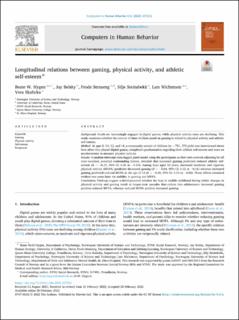| dc.contributor.author | Hygen, Beate Wold | |
| dc.contributor.author | Belsky, Jay | |
| dc.contributor.author | Stenseng, Frode | |
| dc.contributor.author | Steinsbekk, Silje | |
| dc.contributor.author | Wichstrøm, Lars | |
| dc.contributor.author | Skalicka, Vera | |
| dc.date.accessioned | 2023-01-23T13:11:54Z | |
| dc.date.available | 2023-01-23T13:11:54Z | |
| dc.date.created | 2022-04-27T09:42:12Z | |
| dc.date.issued | 2022 | |
| dc.identifier.citation | Computers in Human Behavior. 2022, 132 1-8. | en_US |
| dc.identifier.issn | 0747-5632 | |
| dc.identifier.uri | https://hdl.handle.net/11250/3045372 | |
| dc.description.abstract | Background: Youth are increasingly engaged in digital games; while physical activity rates are declining. This study examines whether the amount of time children spend on gaming is related to physical activity and athletic self-esteem. Method: At ages 8, 10, 12, and 14, a community sample of children (n = 751, 379 girls) was interviewed about how often they played digital games, completed questionnaires regarding their athletic self-esteem and wore an accelerometer to measure physical activity. Results: A random intercept cross-lagged panel model using the participants as their own controls adjusting for all time-invariant potential confounding factors, revealed that increased gaming predicted reduced athletic self-esteem (B = −0.17, 95% CI: 0.26 to −0.10). Among boys aged 10 years, increased moderate and vigorous physical activity (MVPA) predicted decreased gaming (B = −0.64, 95% CI: 1.12 to −0.16) whereas increased gaming predicted reduced MVPA at the age of 12 (B = −0.08, 95% CI: 0.12 to −0.03). These effects remained evident two years later via stability in gaming and MVPA. Conclusions: Findings suggest a developmental window for boys in middle childhood during which changes in physical activity and gaming result in longer-term cascades that endure into adolescence: increased gaming predicts reduced MVPA, whereas reduced MVPA predicts increased gaming. | |
| dc.description.abstract | Longitudinal relations between gaming, physical activity, and athletic self-esteem | |
| dc.language.iso | eng | en_US |
| dc.rights | Navngivelse 4.0 Internasjonal | * |
| dc.rights.uri | http://creativecommons.org/licenses/by/4.0/deed.no | * |
| dc.title | Longitudinal relations between gaming, physical activity, and athletic self-esteem | en_US |
| dc.title.alternative | Longitudinal relations between gaming, physical activity, and athletic self-esteem | en_US |
| dc.type | Peer reviewed | en_US |
| dc.type | Journal article | en_US |
| dc.description.version | publishedVersion | |
| dc.source.pagenumber | 1-8 | en_US |
| dc.source.volume | 132 | en_US |
| dc.source.journal | Computers in Human Behavior | en_US |
| dc.identifier.doi | 10.1016/j.chb.2022.107252 | |
| dc.identifier.cristin | 2019370 | |
| cristin.ispublished | true | |
| cristin.fulltext | original | |
| cristin.qualitycode | 1 | |

